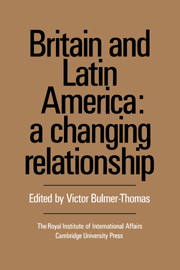Book contents
- Frontmatter
- Contents
- List of contributors
- Preface
- 1 Britain and Latin America in historical perspective
- Part I Cultural and political relations
- 2 Britain's cultural relations with Latin America
- 3 British policy towards Latin America
- 4 The United States factor in British relations with Latin America
- 5 Britain, Latin America and the European Community
- Part II Economic relations
- Part III Sources of friction
- Part IV Conclusions
- Index
4 - The United States factor in British relations with Latin America
Published online by Cambridge University Press: 02 December 2009
- Frontmatter
- Contents
- List of contributors
- Preface
- 1 Britain and Latin America in historical perspective
- Part I Cultural and political relations
- 2 Britain's cultural relations with Latin America
- 3 British policy towards Latin America
- 4 The United States factor in British relations with Latin America
- 5 Britain, Latin America and the European Community
- Part II Economic relations
- Part III Sources of friction
- Part IV Conclusions
- Index
Summary
North American students of the subject habitually bemoan the lack of sustained attention devoted to Latin America by US administrations and Congress. The United States approach, they complain, tends to be episodic and reactive and United States policies to rest, in the words of one critic, ‘on either alarmism or do-goodism’. British Latin Americanists might wish that they had it so good.
For most of the period since 1945 British policy towards Latin America has been understated almost to the point of inaudibility; apart from brief flurries of crisis-management, generally related to problems of post-imperial disengagement, Latin American issues have tended to languish towards the bottom of any list of British ministers' priorities. This is not to say that Britain has had no consistent policy towards Latin America, but in the higher reaches, at least, of both Conservative and Labour governments it has habitually been the consistency of more or less benign neglect. Nor is this altogether surprising. The UK does not have major strategic interests in Latin America and, in contrast with the United States, British governments do not perceive events in the region as capable of posing direct or indirect threats to national security (as opposed to their possible impact on the wider global balance of East-West power and influence). By comparison with the great themes which have preoccupied British policy-makers since 1945, relations with the countries of Latin America were bound to be at best a matter of secondary concern.
- Type
- Chapter
- Information
- Britain and Latin AmericaA Changing Relationship, pp. 68 - 82Publisher: Cambridge University PressPrint publication year: 1989
- 1
- Cited by



